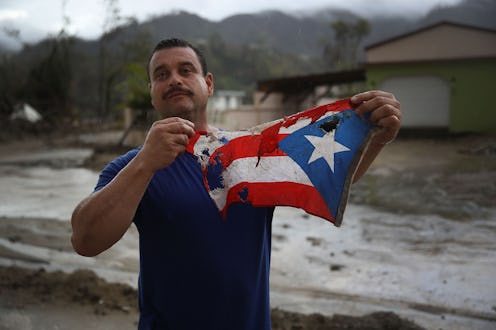News
Most People In The States Still Don't Know Puerto Rico Is In America

In the aftermath of the devastating Hurricane Maria, which ravaged Puerto Rico, the U.S. Virgin Islands, Dominica, and others as it made its way through the Caribbean, a peculiar and deeply worrisome fact has been sharply highlighted. Namely, despite the fact that Puerto Rico is a U.S. territory, and thus Puerto Ricans are U.S. citizens just like anyone you might meet on the mainland, a simply staggering number of people don't know Puerto Rico is part of America.
The startling results were laid bare in polls conducted both last year, and earlier this year. In 2016, a poll from The Economist/YouGov found that fewer than half of all Americans (based on a sample of 1,933 people) knew that children born in Puerto Rico, to Puerto Rican parents, were American citizens. That's just 43 percent of the poll's respondents. Conversely, 41 percent claimed such people were simply "Puerto Rican," while 15 percent replied "not sure."
A Suffolk poll conducted in March of this year further corroborated that finding, with only 47 percent correctly recognizing that a person born in Puerto Rico, to Puerto Rican parents, was an American citizen. In this poll, however, a great deal more people admitted they simply didn't know ― only approximately 30 percent said such people were "Puerto Rican," while approximately 21 percent replied that they weren't sure. A narrow 2.5 percent of respondents replied "other."
This is concerning data, due to what it means for public perception of the initial crisis and ongoing recovery facing Puerto Rico. Although it's been more than two months since Maria tore through the island, the majority of country is still without electricity, and according to NBC News, 10 percent of Puerto Ricans still lack potable water.
It's also been alleged that the actual death toll as a result of the hurricane is far higher than the official count. An analysis by Vox back on Oct. 11, about three weeks after the island was struck, suggested that at least 450 people had died. On Nov. 4, San Juan mayor Carmen Yulin Cruz has made the case that as many as 500 people may have been killed as a result of the storm. And then, on Nov. 9, Puerto Rican authorities announced that 472 more people died in Sept. 2017 than in Sept. 2016, a stark indicator of the storm's human cost.
The upshot of so many Americans' lack of knowledge, of course, is that if less than half even realize Puerto Rico is a part of their country, and that Puerto Ricans are U.S. citizens just like them, public awareness and emphasis on recovery and aid to the island might not be as forceful or passionate as it otherwise would. As Vice noted last month, in the weeks following Maria's destruction, Puerto Rico received hundreds of millions fewer dollars in donations than the greater Houston area did in the aftermath of Hurricane Harvey.
As it stands now, the recovery effort in Puerto Rico is still ongoing, although more slowly than residents of the island and its officials surely desire. Cruz, for her part, has been extremely vocal about the urgency of the situation for weeks, criticizing the Trump administration and the Federal Emergency Management Agency (FEMA) for their response.
Earlier this month, Puerto Rico governor Ricardo Russello requested that the U.S. Congress authorize $94 billion in recovery funds to enable the island to rebuild and repair the damage, including a reported $31 billion towards housing, and nearly $18 billion towards repairing the island's decimated electrical grid. As NPR noted this week, one possible avenue the island might pursue is expanding its use of solar energy, although needless to say, getting power back to the island's residents as swiftly as possible is a high priority.